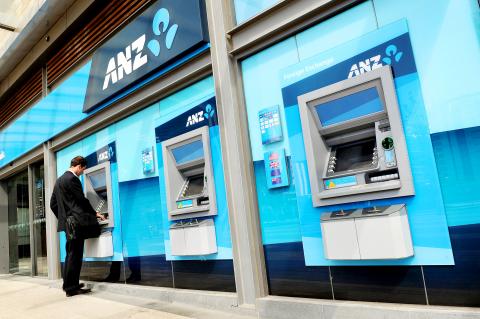Australia and New Zealand Banking Group (ANZ), the country’s fourth-largest bank, said yesterday it will cut about 1,000 jobs this year, as the nation’s lenders look to slash costs to protect profits amid slower loan growth.
Westpac recently announced 400 job cuts and analysts predict thousands more bank layoffs, some possibly in Asia, as market conditions crimp margins and the Australian lenders seek to rein in costs.
“I think it’s quite reasonable to think across the industry we’ll see seven-to-eight thousand jobs domestically shed,” CLSA banking analyst Brian Johnson said.

Photo: AFP
“But before you get too excited about that, some of those jobs will be basically offshored,” he added.
Johnson said while ANZ’s Asian operations were relatively new, offshore job cuts could not be ruled out.
Australia’s top four banks, which also includes National Australia Bank (NAB) and the Commonwealth Bank of Australia, are among the country’s largest employers with almost 40,000 employees each.
While job cuts in the global banking industry are common in turbulent market conditions, Australian banks are coming off more than a decade of almost uninterrupted growth that saw them adding staff, growing assets and boosting profits several-fold.
Last year, Australia’s big four banks together made a record US$25 billion in profits. However, credit growth is at the lowest level since the 1970s, as households increase savings and corporates pay down debt, forcing banks to focus on cost controls.
“A different and very difficult environment is now emerging for banks globally,” ANZ Australia CEO Philip Chronican said.
“Just as we are seeing in other parts of the Australian economy, we are also having to adapt our business to the new conditions and become leaner, more agile and more customer-focused so we ensure the bank remains strong and can grow and invest for the future,” he added.
ANZ angered its customers and Australian political leaders last week when it decided to raise mortgage rates independently of the central bank, also citing intense pressure on margins because of higher funding costs and slow lending growth.
ANZ’s move to slash jobs came under fire yesterday from the Financial Sector Union, which urged the government to intervene to save jobs.
“This is an incredibly profitable, iconic Australian employer that can afford to keep every one of these workers in place and continue to make multibillion-dollar profits,” Financial Sector Union national secretary Leon Carter said.
“This is about greed at the expense of workers,” he added.
The job cuts to ANZ’s Australian staff will take place this year and will be primarily focused in middle-management, back-office and support functions, with customer-facing employee cuts minimal, ANZ said in a statement.
ANZ notified 492 staff yesterday that their roles would be affected, 130 employees were cut earlier this year, with further job losses expected during the year. ANZ employs about 24,000 people in Australia.
Carter, who fears the banking job cuts will continue if conditions do not change, is set to meet NAB and Commonwealth Bank over the next couple of weeks to urge them not to follow Westpac and ANZ.

Intel Corp chief executive officer Lip-Bu Tan (陳立武) is expected to meet with Taiwanese suppliers next month in conjunction with the opening of the Computex Taipei trade show, supply chain sources said on Monday. The visit, the first for Tan to Taiwan since assuming his new post last month, would be aimed at enhancing Intel’s ties with suppliers in Taiwan as he attempts to help turn around the struggling US chipmaker, the sources said. Tan is to hold a banquet to celebrate Intel’s 40-year presence in Taiwan before Computex opens on May 20 and invite dozens of Taiwanese suppliers to exchange views

Application-specific integrated circuit designer Faraday Technology Corp (智原) yesterday said that although revenue this quarter would decline 30 percent from last quarter, it retained its full-year forecast of revenue growth of 100 percent. The company attributed the quarterly drop to a slowdown in customers’ production of chips using Faraday’s advanced packaging technology. The company is still confident about its revenue growth this year, given its strong “design-win” — or the projects it won to help customers design their chips, Faraday president Steve Wang (王國雍) told an online earnings conference. “The design-win this year is better than we expected. We believe we will win

Chizuko Kimura has become the first female sushi chef in the world to win a Michelin star, fulfilling a promise she made to her dying husband to continue his legacy. The 54-year-old Japanese chef regained the Michelin star her late husband, Shunei Kimura, won three years ago for their Sushi Shunei restaurant in Paris. For Shunei Kimura, the star was a dream come true. However, the joy was short-lived. He died from cancer just three months later in June 2022. He was 65. The following year, the restaurant in the heart of Montmartre lost its star rating. Chizuko Kimura insisted that the new star is still down

While China’s leaders use their economic and political might to fight US President Donald Trump’s trade war “to the end,” its army of social media soldiers are embarking on a more humorous campaign online. Trump’s tariff blitz has seen Washington and Beijing impose eye-watering duties on imports from the other, fanning a standoff between the economic superpowers that has sparked global recession fears and sent markets into a tailspin. Trump says his policy is a response to years of being “ripped off” by other countries and aims to bring manufacturing to the US, forcing companies to employ US workers. However, China’s online warriors